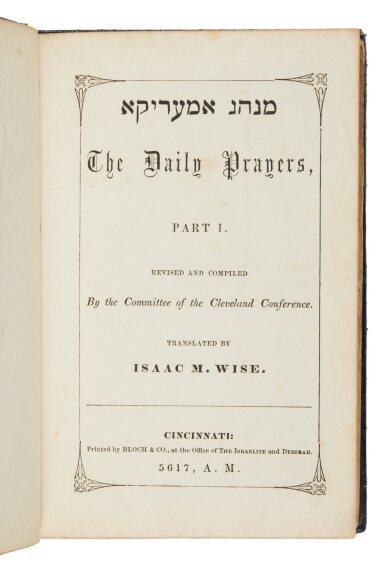Seder ha-Avodah le-Shabatoth ha-Shanah u-Mo’adei Mikra’ei Kodesh ke-Minhag Kahal Bayith Chadash asher be-Hamburg / Ordnung der öffentlichen Andacht für die Sabbath und festtage des ganzen Jahres, nach dem Gebrauche des Neuen Tempel Vereins in Hamburg [Service for Sabbath and festivals of the entire year according to the rite of the New Temple in Hamburg]. Published by S.I. Fränkel und M.I. Bresselau, Hamburg, 1891. Hebrew and German. The first reform prayer book in Hebrew. Reform Judaism originated in Germany and in central Europe in the late 18th and early 19th centuries. One of the heralds of Reform Judaism was Israel Jacobson [to whom this prayer book is dedicated (in print)]. Jacobson was a Jewish-German banker and businessman who headed the Jewish Consistory of Westphalia (a body governing the Jewish matters of Westphalia in Germany), and in his capacity as head of the consistory introduced changes in the order of prayers and in Jewish customs. The first attempt to establish a reform synagogue was in 1810 in the town of Seesen near Hannover, but it did not last long. In 1815 reform services were held in private homes in Berlin, with shortened prayers, passages in German, a choir and organ accompaniment. A reform congregation was founded in Hamburg in 1817, and in 1818 the Hamburg Temple, the first Reform Synagogue, was inaugurated. The prayer book offered here was printed there and is a "revised" prayer book that for the first time introduced changes in the Hebrew prayer version. Among other changes, passages of prayer for "Shivat Zion" (return to Zion) were omitted. The prayers in the Temple and the prayer book led to a fierce opposition on the part of rabbinical leadership, and as a reaction the book "Ele Divrei HaBrit" was published compiling Halachic responses by leading European rabbis who ruled that changing the order of prayers is absolutely forbidden. Bound at the end of the prayer book is a document of four pages on behalf of Die Direction des Neuen-Tempel-Vereins (directorship of the New Synagogue Union) titled "Bekanntmachung" [announcement] with printed regulations concerning conduct in the synagogue and during prayer (including regulations concerning the choir, donations, Azkarat Neshamot, confirmation ceremony, and more). X, 356, 65-108, [4] pp, 19.5 cm. Fair condition. Stains and tears. Adhesive tape to some leaves. Several leaves restored with paper. Lacking spine. Detached binding. First signature and last ten leaves are partly detached. Ink stamps. Inscription in pen on Hebrew title page.
Seder ha-Avodah le-Shabatoth ha-Shanah u-Mo’adei Mikra’ei Kodesh ke-Minhag Kahal Bayith Chadash asher be-Hamburg / Ordnung der öffentlichen Andacht für die Sabbath und festtage des ganzen Jahres, nach dem Gebrauche des Neuen Tempel Vereins in Hamburg [Service for Sabbath and festivals of the entire year according to the rite of the New Temple in Hamburg]. Published by S.I. Fränkel und M.I. Bresselau, Hamburg, 1891. Hebrew and German. The first reform prayer book in Hebrew. Reform Judaism originated in Germany and in central Europe in the late 18th and early 19th centuries. One of the heralds of Reform Judaism was Israel Jacobson [to whom this prayer book is dedicated (in print)]. Jacobson was a Jewish-German banker and businessman who headed the Jewish Consistory of Westphalia (a body governing the Jewish matters of Westphalia in Germany), and in his capacity as head of the consistory introduced changes in the order of prayers and in Jewish customs. The first attempt to establish a reform synagogue was in 1810 in the town of Seesen near Hannover, but it did not last long. In 1815 reform services were held in private homes in Berlin, with shortened prayers, passages in German, a choir and organ accompaniment. A reform congregation was founded in Hamburg in 1817, and in 1818 the Hamburg Temple, the first Reform Synagogue, was inaugurated. The prayer book offered here was printed there and is a "revised" prayer book that for the first time introduced changes in the Hebrew prayer version. Among other changes, passages of prayer for "Shivat Zion" (return to Zion) were omitted. The prayers in the Temple and the prayer book led to a fierce opposition on the part of rabbinical leadership, and as a reaction the book "Ele Divrei HaBrit" was published compiling Halachic responses by leading European rabbis who ruled that changing the order of prayers is absolutely forbidden. Bound at the end of the prayer book is a document of four pages on behalf of Die Direction des Neuen-Tempel-Vereins (directorship of the New Synagogue Union) titled "Bekanntmachung" [announcement] with printed regulations concerning conduct in the synagogue and during prayer (including regulations concerning the choir, donations, Azkarat Neshamot, confirmation ceremony, and more). X, 356, 65-108, [4] pp, 19.5 cm. Fair condition. Stains and tears. Adhesive tape to some leaves. Several leaves restored with paper. Lacking spine. Detached binding. First signature and last ten leaves are partly detached. Ink stamps. Inscription in pen on Hebrew title page.










Testen Sie LotSearch und seine Premium-Features 7 Tage - ohne Kosten!
Lassen Sie sich automatisch über neue Objekte in kommenden Auktionen benachrichtigen.
Suchauftrag anlegen